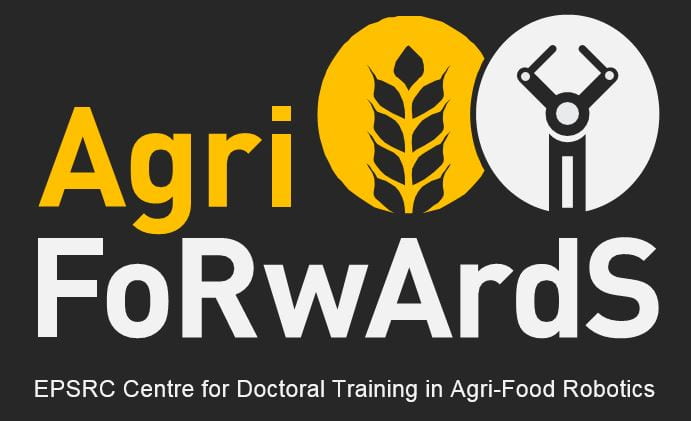AgriFoRwArdS CDT students as well as other robotics focused CDTs from across the UK were invited to attend the 2022 student CDT conference at the EPSRC Centre for Doctoral Training in Future Autonomous and Robotic Systems (FARSCOPE), part of a collaboration between Bristol University and the University West of England.
The conference is an annual two day event and was held across the 13th and 14th June. The conference provides a space for early researchers to present their work in either poster format or presentation, as well as to develop their network with their peers. Papers and posters are able to be submitted prior to the conference and awards were provided (nominated by students in attendance) on the day for best presentation and best poster.
This was the first time in a few years the event has been held face to face and it was really exciting to meet and have the chance to speak with other CDT students across the robotics, ML and AI domains, particularly as each CDT has a different overall focus.
Over the two days around 120 students attended the conference with presentations staged over three segments across both days. Our very own Cohort 2 CDT student Harry Rogers, held one of the first presentation slots on day one of the conference. Harry’s presentation was on “Explainable Droplet Recognition System for Precision Sprayer Applications“.
Sunday: Arriving in Bristol
Students were invited to arrive a day early to the conference to attend a wonderful harbourside tour of the Bristol docks. This was a chance to informally meet other members of the other CDT groups. A follow on evening meal and drink was arranged by The AgriFoRwArdS CDT team to help everyone relax prior to the conference event.
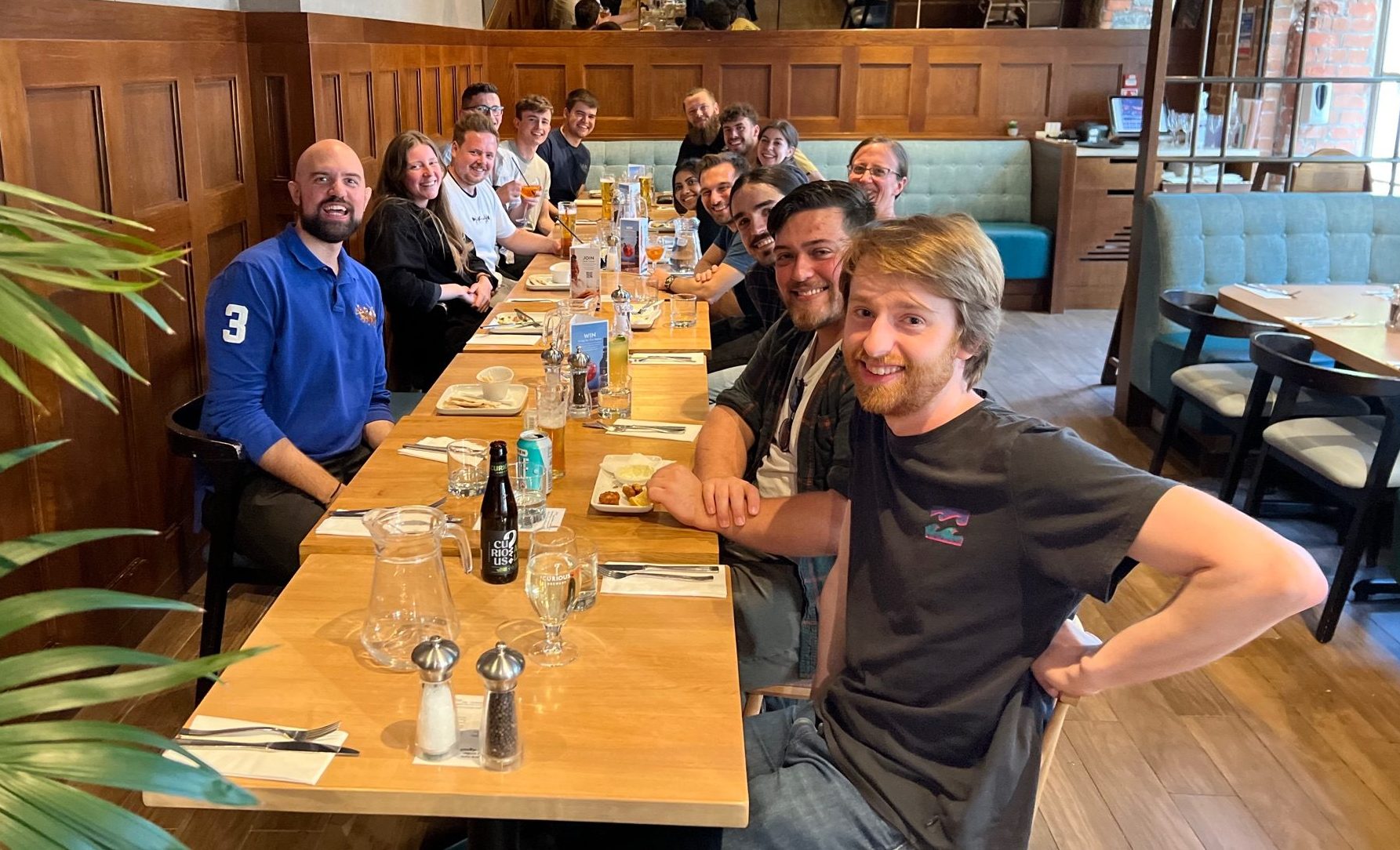
For a large section of the attendees, this would be their first conference as AgriFoRwArdS CDT students, and having the opportunity to mix informally with other CDT students enabled friendships to begin prior to the opening day of the event.
Monday: Day 1 of the conference
On the first day of the conference students were invited to register for the event and get some initial refreshments. For both days meals and drinks were provided throughout.
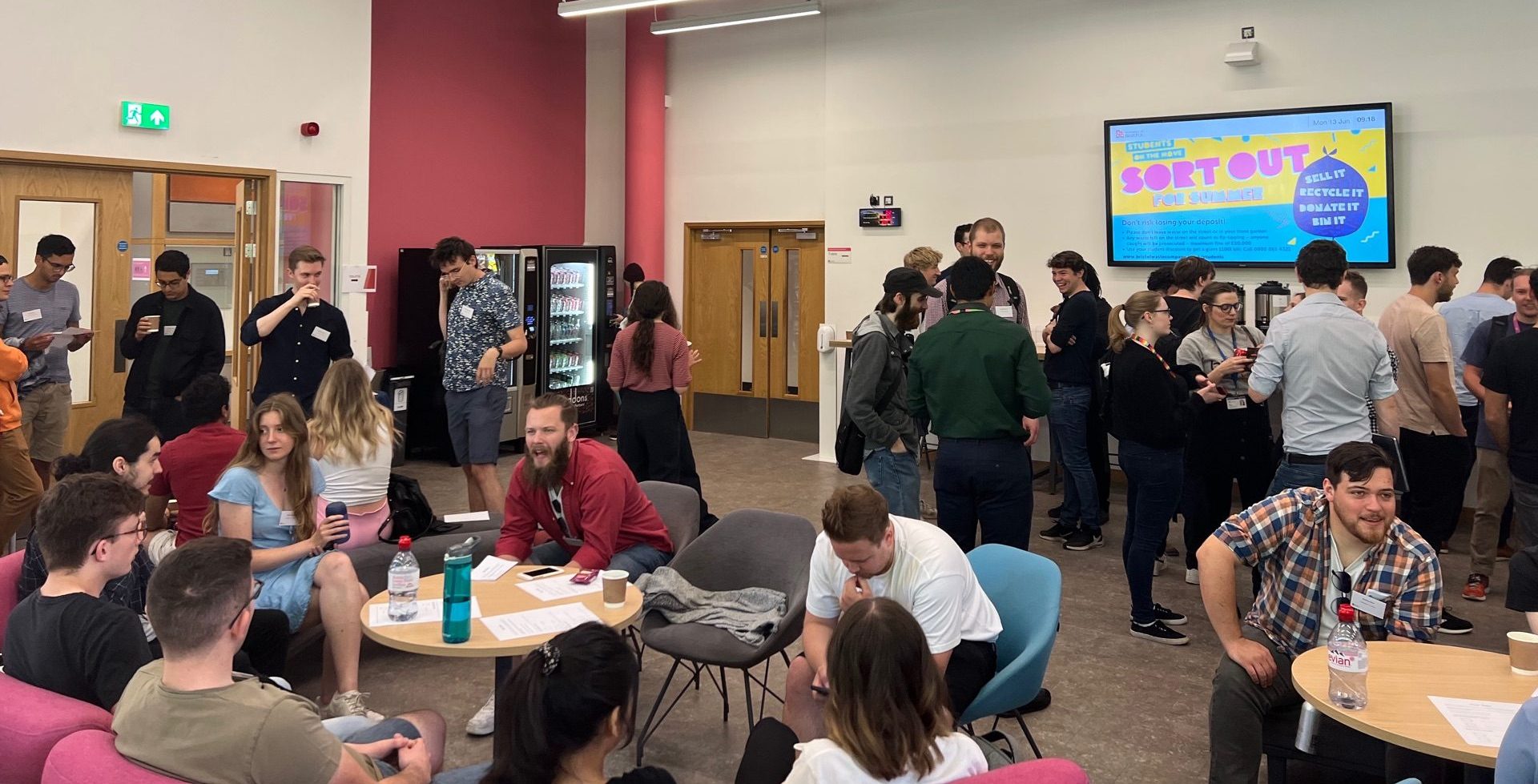
The first day was held at the University of Bristol, Bill Brown Design Suite. For CDT students staying in the Travelodge (Bristol Central), this also provided a nice way to get our 10,000 steps in for the day, as well as a some altitude training! (The suite is perched on a high spot in Bristol!). The walk did however provide a wonderfully scenic route and allowed students to really enjoy being in a different city to their current studies.
The Day One session started at 09:30 with four student presentation sessions. Harry Rogers took the second presentation spot at 09:45. Once the four presentations sessions had ended, a poster spotlight session 1 took place (1 of 2 for the day). This gave students a chance to first speak with the presenters on their topics but also a chance to mingle, look at different styles of research as well as reflect on how each poster was presented.
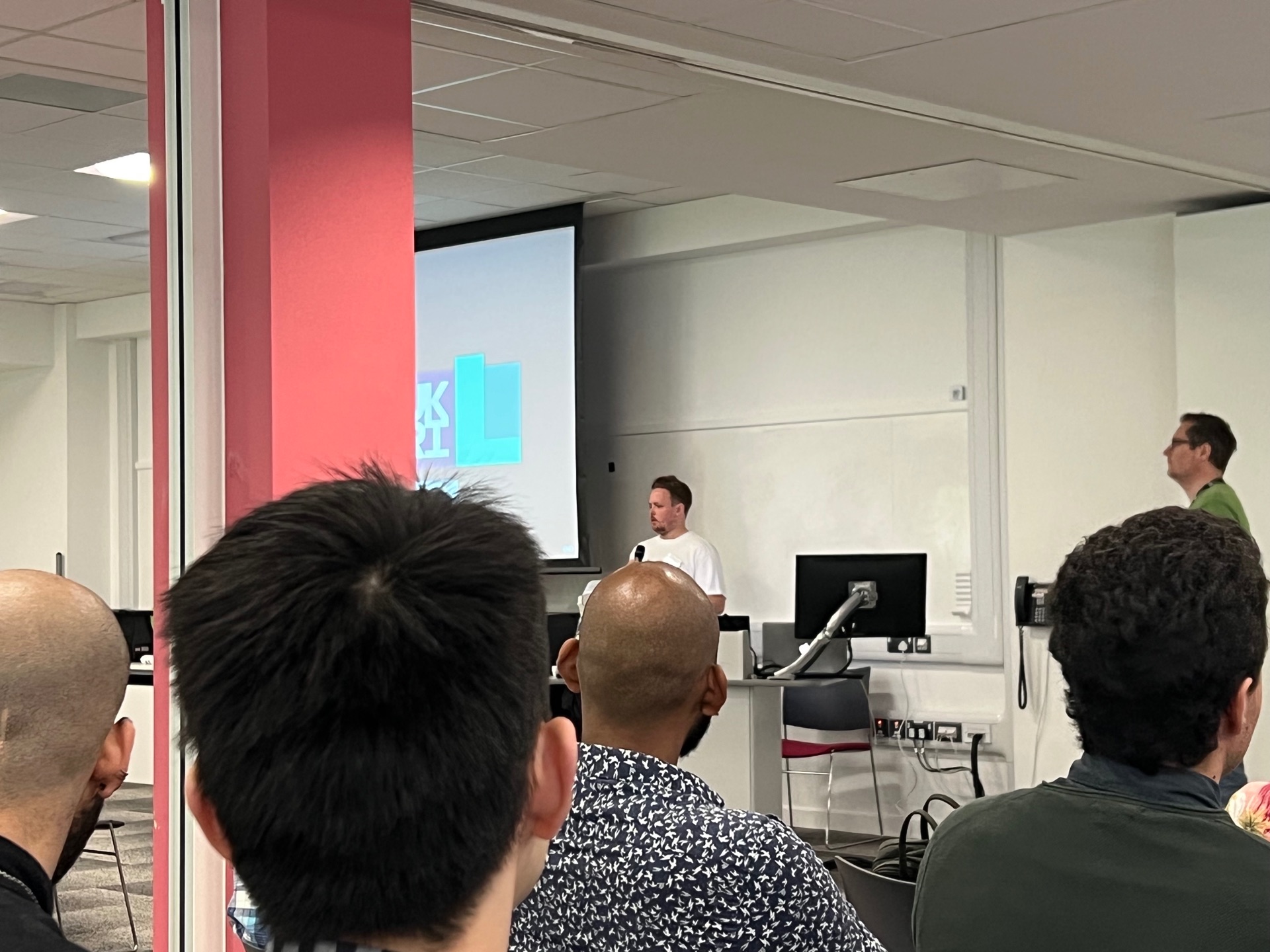
Following the intermission the conference was treated to a fascinating talk by Prof Michael Levin, world renowned synthetic biologist from Tuffts University known primarily for the discovery of Xenobots. Prof Levin spoke in depth about the implementation of mind in a range of biological, engineered, and hybrid systems. The discussion ranged from how caterpillars can retain memories as they go through metamorphosis into butterflies – even though their brains turn to liquid during the process – to bioinformatics of shape. These talks were hugely inspiring and provoked a large amount of discussion in the room, and following Q&A session.
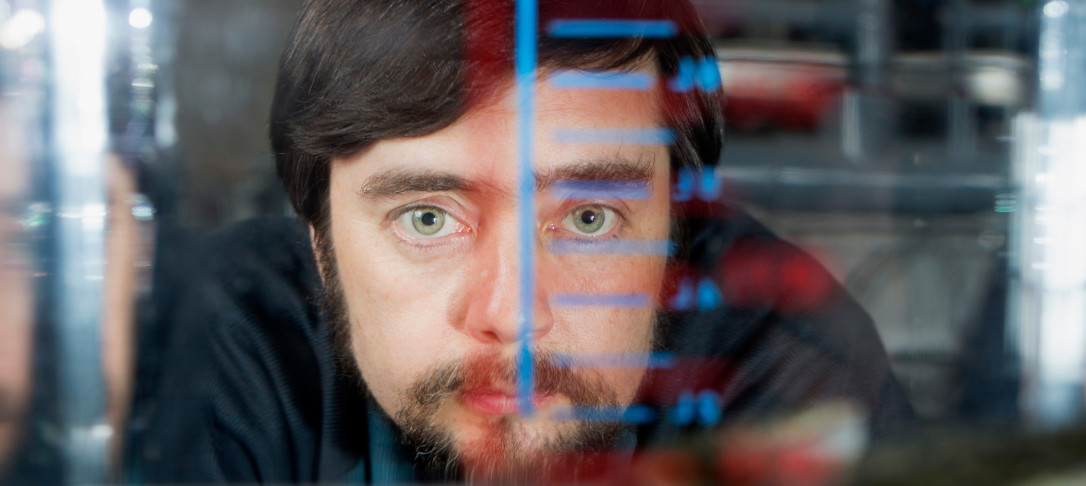
Once the Prof Levin’s talk had concluded, it was time for lunch. This consisted of a buffet and general chit chat with other students. The idea of holding Prof Levin’s talk pre-lunch was great as this also gave students something to break the ice with outside of their research.
Following lunch, students were treated to a further suite of presentations and the second spotlight poster session. The day closed with a final round of presentations and summary of the day by the conference host and chairperson, Dr Helmut Hauser.
All conference attendees were then invited to a group meal at ZeroDegrees, a very trendy restaurant and bar just a stones throw from the centre of Bristol with fantastic terraces providing views of the surrounding Bristol city scape. Almost every single attendees was jammed packed in and around ZeroDegrees and this provided a great environment to mingle and further speak with other CDT students, which many AgriFoRwArdS students did. FARSCOPE kindly provided food and a drink which many students took advantage of (there also happened to be the larger beer style mugs where many enjoyed the mango beer!). This was a nice end to a busy and enjoyable day.
Tuesday: Day 2 of the conference
Day Two of the conference started where Day One had left off, however this session was based at the University West of England, Bristol Robotics lab. This is a huge purpose built building dedicated to academic multi-disciplinary robotics research. Every conceivable lab was available with all of the latest tools and equipment to fly drones (indoors) across to testing full size autonomous 4×4’s.
The day started with a meet and greet and refreshments provided in the main atrium. Events were due to start at 09:30 with the day closing at 15:15. The first session was a keynote speech by Prof Alan Winfield who is Professor of Robot Ethics at the University of the West of England, Bristol, visiting Professor at the University of York, and Associate Fellow of the Leverhulme Centre for the Future of Intelligence, University of Cambridge.
Prof Winfield (who had his own special guest of honour – his very well behaved dog!), took us on a wonderful journey through the importance of ethical practice in robotics, as well as methods to help develop ethical models. Discussions were also based around standards and the growing importance of these frameworks in the role of AI, ML and robotics in general.
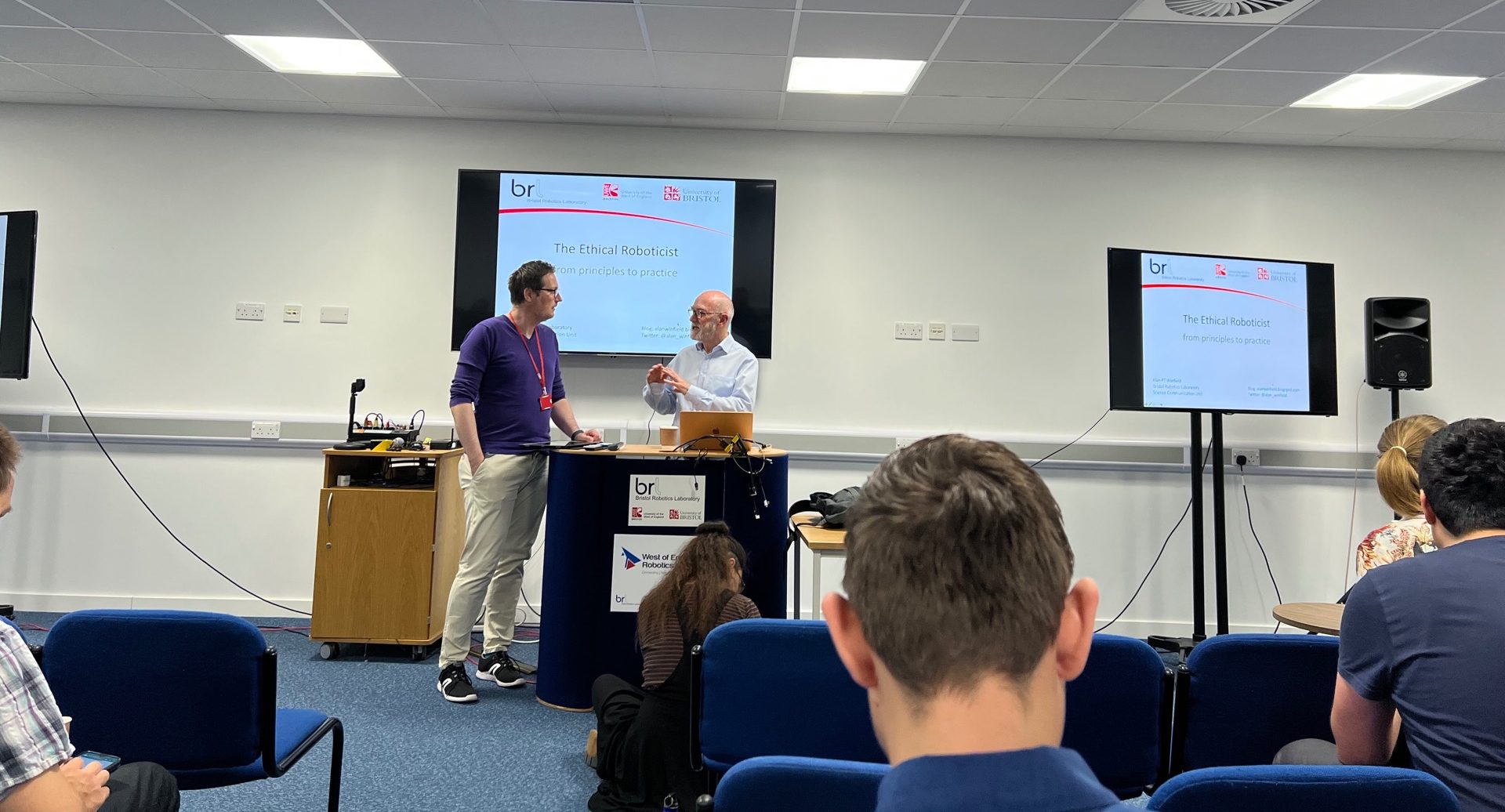
Following Prof Winfield, two industry talks by Dr Farid Dailami who is Associate Professor for Knowledge Exchange in Manufacturing at UWE Bristol, and Dr Marina Konstantatou who is an associate at the Specialist Modelling Group (SMG) at Foster + Partners, took place.
Dr Dailami, spoke about the Robotics Innovation Facility (RIF), a unit of Bristol Robotics Laboratory since 2013. He introduced the concept of RIFs in the European Robotics and Automation landscape and the consequences of the ‘valley of death’ and its impact on the adoption of new technologies.
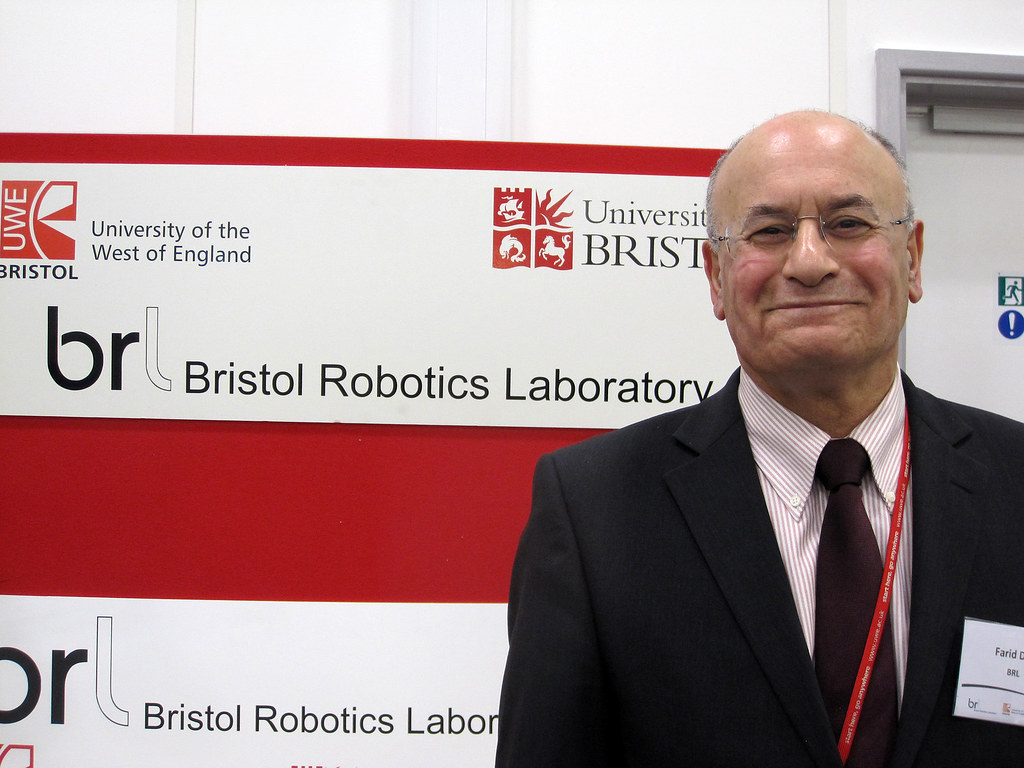
Interestingly, Dr Konstantatou earned her PhD through a CDT placement within the EPSRC Centre for Doctoral Training in Future Infrastructure and Built Environment, at the University of Cambridge. This was timely as it allowed students to also ask questions on her experiences through a CDT program as well as the keynote topic.
Dr Konstantatou spoke about the history of robotics in relation to additive manufacture at F+P and its recent applications in construction on Earth as well and Mars! This presentation discussed how additive manufacture has revolutionised prototyping, visualisation, and the design process itself with a focus on the role of the Specialist Modelling Group (SMG) at F+P. Dr Konstantatou also shared example research covering a wide range of materials, applications; from concrete to steel and basalt, and from bone-inspired structures to lunar habitat vaults!
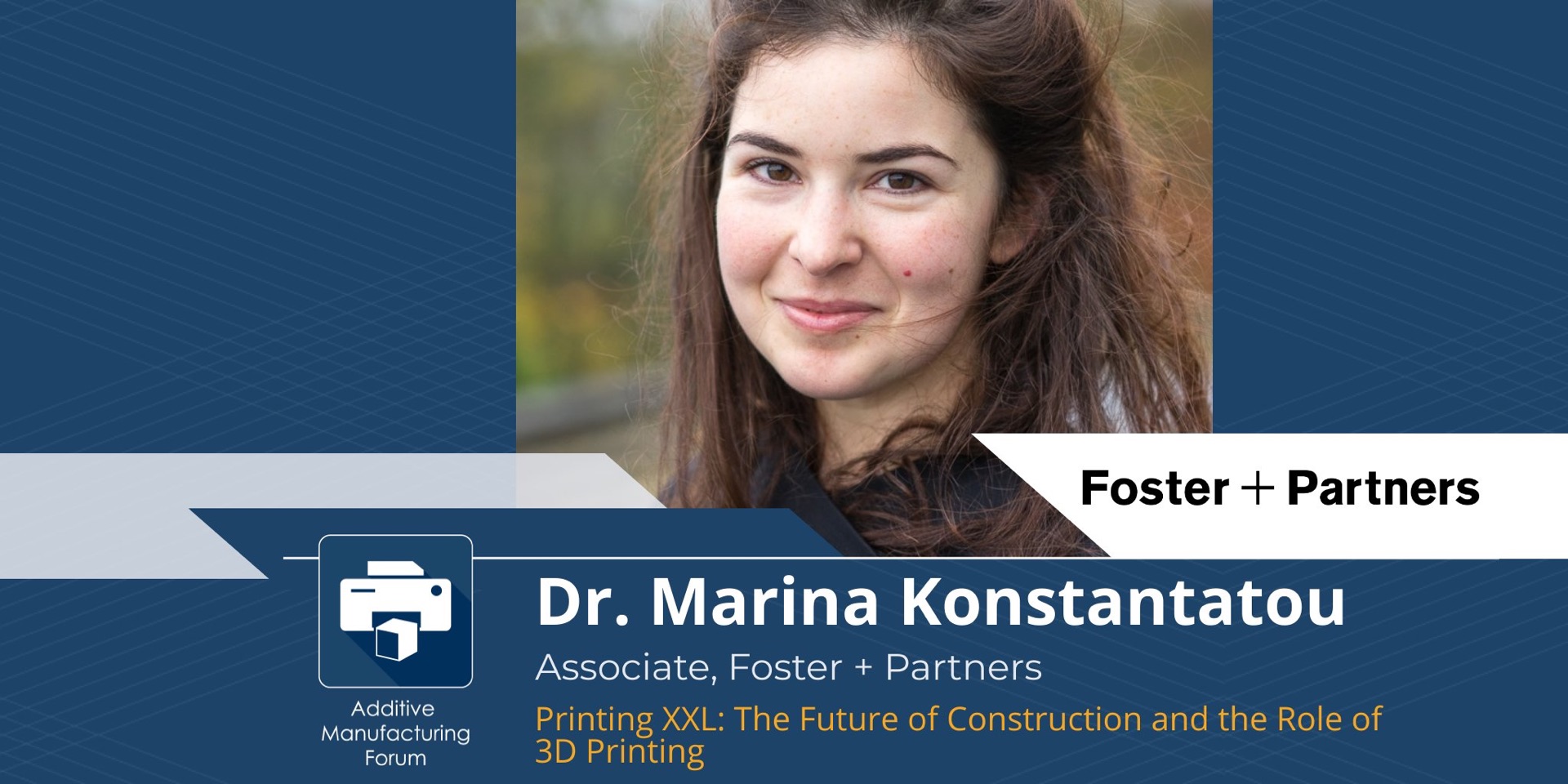
Both talks were extremely inspiring and caught the audiences imagination. Marina’s topics of off-earth structures and autonomous methods to build and assembly them, certainly caught the attention of several students working in similar domains (in particular, Francia Labia – Swarms for Sampling and Detection of Life in Caves on Earth and in Space).
Once the invited speaker presentations were over lunch was made available in the atrium of the robotics lab. This was a really nice change to catch a breath and have a casual sit down with a bite to eat. Afterwards from 13:00 – 15:00, three separate parallel sessions took place: [1] Women in Robotics, [2] PechaKucha Competition, [3] BRL Lab Tours. Each of these activities was very well attended by the AgriFoRwArds students.
As the days session closed, poster and presentation awards were given out. This was a very high quality field and both awards went to Oxford AIMS CDT students, with best Presentation going to Charig Yang “It’s About Time: Analog Clock Reading in the Wild” and Best Poster going to Matt Jackson and Shreshth Malik “Improving Few-Shot Learning using Task-Informed Meta-Initialisation”. They were both really great.
Students celebrated the day with a round of applause and contacts given out and shared. The AgriFoRwArdS bus was due to depart at 16:00 which also meant 30-40 minutes were free to have a sit down in the University West of England Student Union bar, and catch some sunshine before the 4 hour journey home. By this time, everyone was thoroughly exhausted and looking forward to the quiet coach ride home.
A huge thank you to the FARSCOPE CDT team and Dr Helmut Hauser for hosting and arranging this years student CDT conference. By the general feedback given on the day, the CDT conference was very well received with many students given more confidence by their attendance as well as new network and contacts developed through the event.
If you are interested in learning more about what we do and if you share a passion for agriculture and technology then go to our AgriFoRwArdS CDT website to see more about our research, how you can be involved and how to apply to be a student in the program.
